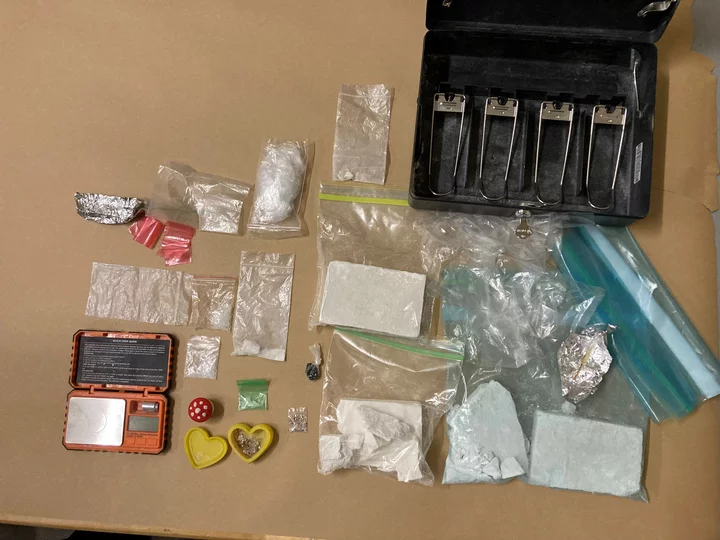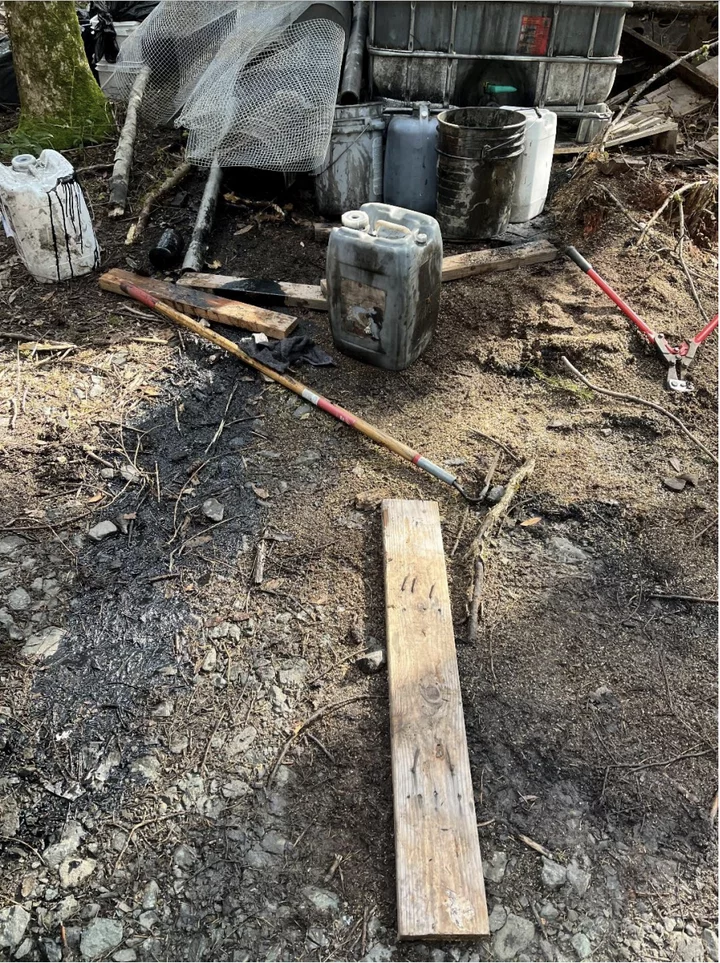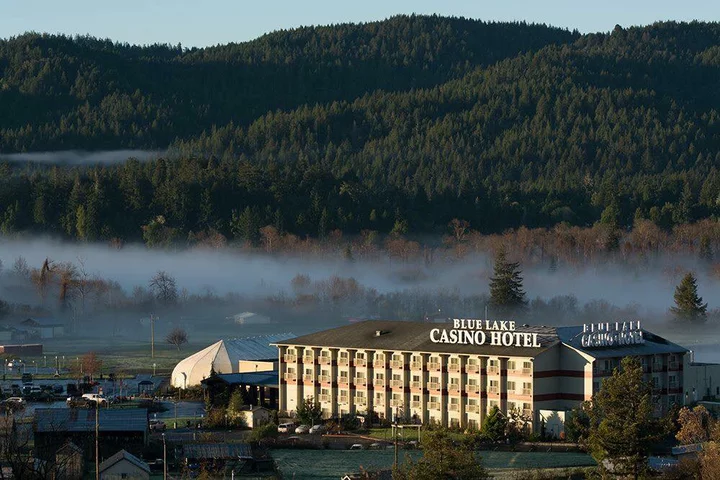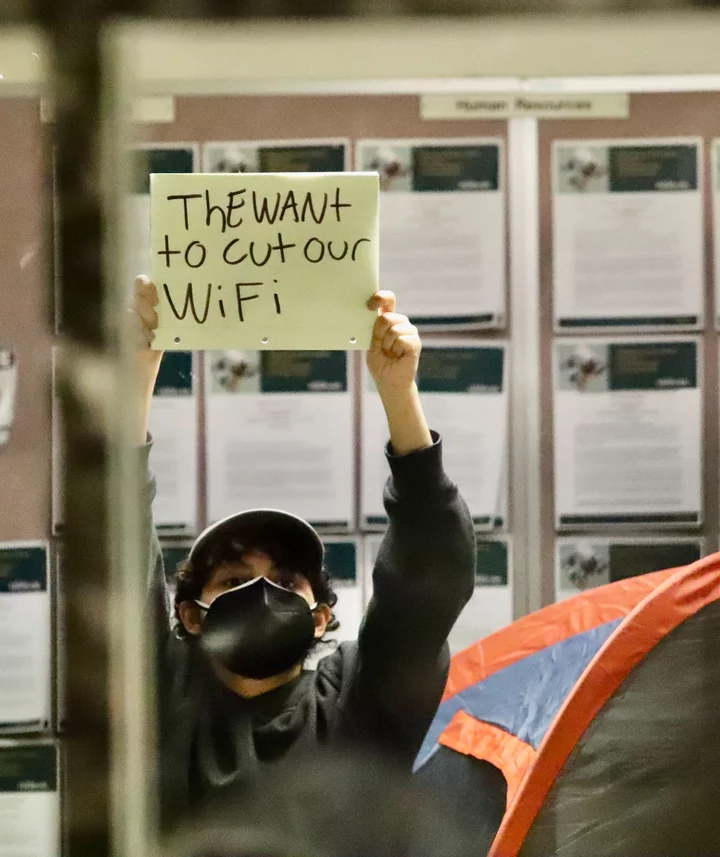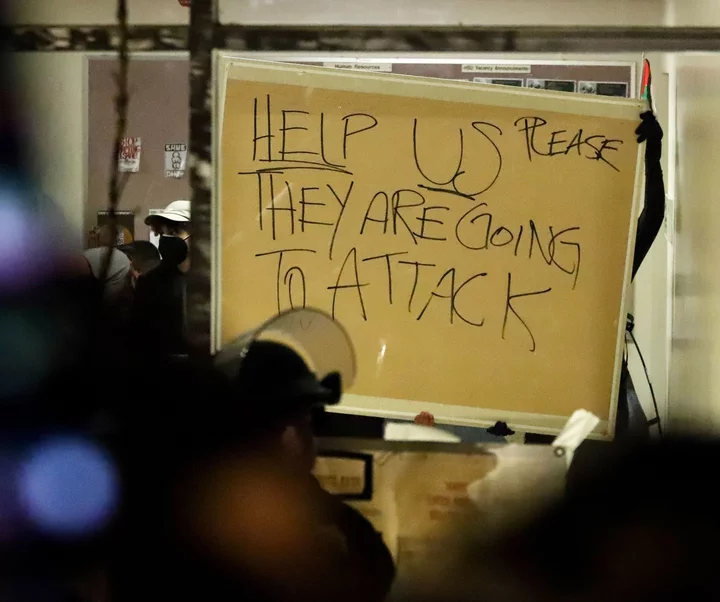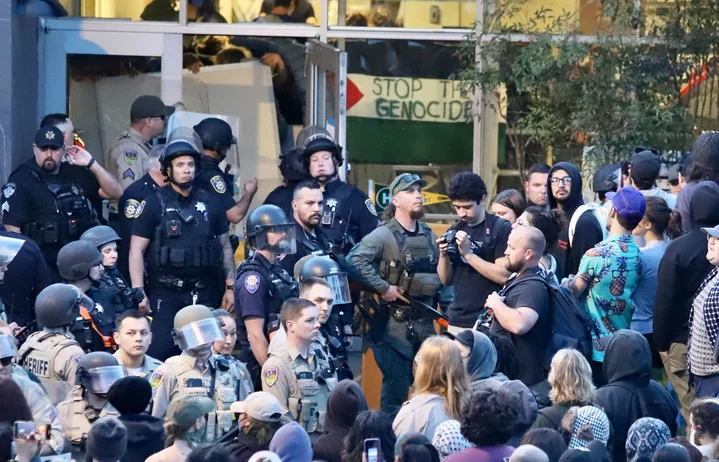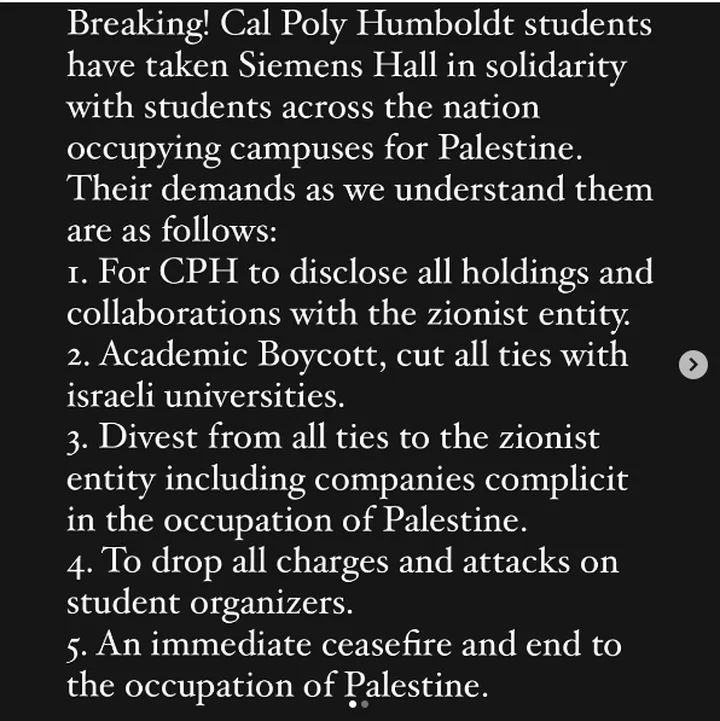Drug Task Force Seizes Over Three Pounds of Fentanyl After Tracking Eureka Man From Oakland, Agency Says
LoCO Staff / Tuesday, April 23 @ 10:31 a.m. / Crime
Photos via HCDTF
###
Press release from the Humboldt County Drug Task Force:
On April 22, 2024, Humboldt County Drug Task Force (HCDTF) Agents with assistance from the Humboldt County Sheriff’s Office Marijuana Enforcement Team (HCSO MET), served a search warrant on Albert Boone (66 years old from Eureka). HCDTF Agents observed Boone travel from Humboldt County to Oakland, California. Upon Boone’s return to Humboldt County, Agents conducted a traffic stop on his vehicle as he entered the city of Fortuna.
Boone, Kauffman, Dickens
Inside the vehicle, Agents located Albert Boone, Lindsay Kauffman (39 years old from McKinleyville), Emerald Dickens (37 years old from Eureka), approximately three pounds of fentanyl, 5 grams of methamphetamine, 2 grams of heroin, a digital scale, drug paraphernalia, and approximately $5,000.00 in U.S. Currency.
Albert Boone was transported to the Humboldt County Correctional Facility where he was booked on the following charges:
- HS11351- Possession of a Controlled Substance for Sales
- HS11352(A)- Transportation of a Controlled Substance for Sales
- HS11352(B)- Transportation of a Controlled Substance through Noncontiguous Counties
Lindsay Kauffman was transported to the Humboldt County Correctional Facility where she was booked on the following charges:
- HS11351- Possession of a Controlled Substance for Sales
- HS11352(A)- Transportation of a Controlled Substance for Sales
Agents then served a search warrant on a hotel in Eureka that had been occupied by Albert Boone.
Agents located Emerald Dickens who was ultimately transported to the Humboldt County Correctional Facility where she was booked on an active warrant from an outside agency.
Anyone with information related to this investigation or other narcotics related crimes is encouraged to call the Humboldt County Drug Task Force at 707-267-9976.
BOOKED
Yesterday: 4 felonies, 8 misdemeanors, 0 infractions
JUDGED
Humboldt County Superior Court Calendar: Today
CHP REPORTS
4408-4799 Sr96 (HM office): Traffic Hazard
ELSEWHERE
The Guardian: Great Britain has worst rate of child alcohol consumption in world, report finds
Huffington Post: New York Appeals Court Overturns Harvey Weinstein’s 2020 Rape Conviction
Politico: Collapse of wind farm projects spoils New York’s climate goals. Here’s why.
Politico: US accuses China of backing Russia’s invasion of Ukraine
(PHOTOS) Marijuana Enforcement Team Busts Large, Illegal Grow Near Berry Summit, Sheriff’s Office Says
LoCO Staff / Tuesday, April 23 @ 9:15 a.m. / Cannabis , Crime
Photos via HCSO
###
Press release from the Humboldt County Sheriff’s Office:
On April 17, 2024, deputies with the Humboldt County Sheriff’s Office Marijuana Enforcement Team (MET) served a search warrant to investigate illegal Indoor cannabis cultivation in the Berry Summit area of the County. The California Fish and Wildlife and Humboldt County Hazardous Waste assisted in the service of the warrant.
One property was investigated during the service of the warrant. The parcel did not possess the required county permit and state license to cultivate cannabis commercially.
During the service of the warrant, deputies eradicated approximately 8,334 growing cannabis plants. Deputies seized and destroyed over 75 pounds of cannabis bud, 55 pounds of cannabis shake, and 74 pounds of processed cannabis. Deputies located two large diesel tanks leaking fuel onto the ground. Along with several large oil spills. Fish and Wildlife Biologist located the following violations:
- (4) FG 1602: Obstructing/Diverting flow of a stream
- (10) FG 5650: Unlawful to pollute Waters of the State
- (7) FG 5652: Unlawful to deposit any garbage, refuse, or waste in Waters of the State
Additional violations with civil fines are expected to be filed by the assisting agencies.
No arrests were made during the service of the warrant. The case will be forwarded to the DA’s Office for review.
Anyone with information about this case or related criminal activity is encouraged to call the Humboldt County Sheriff’s Office at (707) 445-7251 or the Sheriff’s Office Crime Tip line at (707) 268-2539.
Big, Loud Disaster Drill Scheduled at the Blue Lake Rancheria Tomorrow; Businesses Will Remain Open
LoCO Staff / Tuesday, April 23 @ 7:47 a.m. / Non-Emergencies
Photo: Blue Lake Rancheria.
Press release from the Blue Lake Rancheria:
The Blue Lake Rancheria will hold a full-scale emergency simulation exercise on Wednesday, April 24, between the hours of 8 a.m. and 2 p.m. It will take place in and around the area of the Blue Lake Casino Hotel Sapphire Palace, located at 777 Casino Way in Blue Lake.
The exercise will be loud and includes participation from local first responder agencies from around the region.
During the exercise, those in the vicinity of the Blue Lake Casino Hotel should expect to hear simulated emergency conditions and actions, as well as see participants with simulated injuries, law enforcement, fire and emergency medical services personnel responding to the simulated emergency. First responders may impede traffic flow for vehicles and pedestrians near the casino.
All Blue Lake Rancheria businesses will remain open during the exercise.
The community should be prepared for a large emergency response and temporary traffic controls on the day of the event. The training simulation will require flexibility near the location of these closures. Please follow signage on the day of.
The purpose of the exercise is to train casino staff and local first responders on how to respond to an emergency at the Blue Lake Casino complex. The emergency simulation is intended to provide a real-time, realistic experience of an emergency and allow first responders from several partnering agencies to practice together, evaluate their emergency response procedures and solidify strong operational relationships.
For more information regarding the emergency simulation exercise, please email Andrew Bogar, mailto:abogar@bluelakerancheria-nsn.gov or call 707-668-5101 x1065.
Due to the sensitive nature of the exercise, it will be closed to the media. For media inquiries, please contact Isak Brayfindley, ibrayfindley@bluelakerancheria-nsn.gov
About the Blue Lake Rancheria
The Blue Lake Rancheria, California (BLR) is a federally recognized, sovereign Native American tribe and government located in northwest California. BLR was originally established as a refuge for homeless Indians by Executive Order in 1908. In 1958, during the ‘era of termination,’ BLR was terminated as a Tribe by the federal government. After 25 years of termination, and as a result of the Tillie Hardwick v. United States of America decision, BLR was reinstated as a federally recognized Tribe in 1983. Today, BLR has ~100 acres of trust lands spanning the Mad River in Humboldt County, California, within the ancestral territory of the Wiyot people. For more information please see this link.
Judge Rejects Changing the Name of California’s Trans Youth Ballot Measure
Carolyn Jones / Tuesday, April 23 @ 7 a.m. / Sacramento
Supporters of transgender rights gathered at the Capitol during a press conference on March 17, 2022. Photo by Miguel Gutierrez Jr., CalMatters
A group working on a fall ballot initiative that would limit the rights of transgender students lost a round in court Monday when a judge sided with the state in its description of the measure.
Sacramento County Superior Court Judge Stephen Acquisto ruled that Attorney General Rob Bonta’s title, “Restricts Rights of Transgender Youth,” is a fair description of the initiative, which would require schools to notify parents if a student identifies as transgender, ban gender-affirming care for those under 18 and place other limits on students who identify as a gender other than what they were assigned at birth.
The ruling is a setback for the group, dubbed Protect Kids California, as it tries to meet a May 28 deadline to collect 550,000 signatures to qualify for the fall ballot. The group has so far raised just over 200,000 signatures, organizers said.
Protect Kids California, led by Roseville school board member Jonathan Zachreson, put forth the initiative in November, calling it the “Protect Kids of California Act,” but a day after the group filed its paperwork with the Secretary of State, Bonta gave the initiative a new name and summary. The new name, Restricts Rights of Transgender Youth, and description made it harder to collect signatures and donations, Zachreson said, leading the group to sue for a name they said would be more reflective of the initiative’s goals.
It’s not unusual for groups to sue the state attorney general over ballot initiative language, in hopes of getting a more persuasive name or summary. Ballot language can significantly influence voters’ opinions of initiatives, according to polling by the Public Policy Institute of California, especially among voters who aren’t well informed on issues. Judges usually side with the attorney general, citing a state election code that says the court should overturn the attorney general’s ballot language “only upon clear and convincing proof that the material in question is false, misleading, or inconsistent.” As Sacramento Superior Court Judge Laurie Earl put it in 2020, “The court is not a copy editor.”
Beyond the current initiative, challenges to LGBTQ student rights have been erupting at school boards up and down California for at least a year, largely at the behest of Assemblyman Bill Essayli, a Republican from Riverside. Essayli proposed a bill in 2023 that would require schools to notify parents about students’ gender identity, and when the bill didn’t get a hearing in the Assembly education committee he took his campaign directly to school boards.
School boards in Chino, Temecula, Roseville, Rocklin and Anderson are among those that have recently passed parental notification policies, stoking the wrath of Bonta and Gov. Gavin Newsom. In September, Bonta sued Chino Valley Unified over its policy, claiming it’s discriminatory, and a judge granted a preliminary injunction in October.
Protect Kids CA originally proposed three separate initiatives addressing the rights of transgender students but last fall combined them into one. If it passes, the initiative would:
- Require students to use bathrooms that align with the gender they were assigned at birth
- Prohibit transgender girls in seventh grade or older from participating in girls sports or other girls-only activities
- Ban gender-affirming health care — including surgery or hormone treatment — for transgender students under age 18, even if parents consent or the treatment is recommended by a doctor
- Require schools to notify parents if students change their pronouns or otherwise signal they identify as a gender other than what’s on their official student records
At a hearing Friday, Zachreson’s group argued that the state’s ballot language is biased and misleading, and doesn’t accurately reflect what the initiative would do. Bonta’s summary says the initiative would require parental notification “without exception,” but Zachreson’s group argued that schools would be required under existing law to not inform parents if students would be subject to abuse or neglect at home as a result.
Attorneys also argued over the definition of “privacy.” The California Department of Education says that students have a right to privacy on issues related to their gender identity. Attorneys for Protect Kids CA argued that the policy was never approved by voters, courts or the Legislature, and in fact federal law says parents have a right to view student records.
###
The Calmatters Ideas Festival takes place June 5-6! Find out more and get your tickets at this link.
CalMatters.org is a nonprofit, nonpartisan media venture explaining California policies and politics.
OBITUARY: Magnolia Yellowhorse White, 1987-2024
LoCO Staff / Tuesday, April 23 @ 6:56 a.m. / Obits
Magnolia Yellowhorse White was born on June 29, 1987 to Peggy Sue Gensaw and Steven Bruce Kaye. She was an enrolled member of the Yurok Tribe, but was also Karuk, Tolowa, Chetco, Navajo and Hopi.
She was born and raised in Humboldt County but spent most of her childhood traveling to see family and attending numerous cultural events. Maggie started dancing at pow wows as soon as she could walk. She danced many styles but decided to focus on being a women’s traditional dancer. She took pride in the fact that she made her own regalia.
Maggie attended numerous schools in Humboldt County and graduated from Zoe Barnum HS. In those years she participated in cheerleading, tennis, JROTC and various school clubs. More recently she had been attending classes at College of the Redwoods to further her education.
Maggie was a proud mother to four beautiful children. As a devoted mother, she raised her kids in parts of southern Oregon and northern California. Much of her adult life was spent making memories with her family and loving her kids with all of her heart.
Maggie was full of life and enjoyed many things. She liked being outdoors hiking, biking, and found comfort in going to the beach. She also enjoyed cuddling with her kids and cats to watch shows and movies, as well as listening to music. Maggie was also a very talented artist. Through her artwork, she was able to express herself. She had a great sense of humor and brought beauty and light into the world through her smile and laughter.
She spent her final days surrounded by family before passing peacefully in Santa Rosa on April 10, 2024.
She is survived by her children Aeris, Magnolia, Enoch, and Johann White. Brother Jaimoe Kibby, sisters Kristin Kaye, Jasmine Gensaw-Kaye, Camelia Cardoza, and father Bruce Kaye. She comes from a huge family and leaves behind many aunts, uncles, cousins, nieces, and nephews. She was preceded in death by her maternal and paternal grandparents and mother aawok Peggy Sue Gensaw.
She will be laid to rest in her family plot in Requa on Saturday, April 27 at 1 p.m. Friends, family, and loved ones are welcome to join and say final farewell. A celebration of life will be held at a later date this summer.
###
The obituary above was submitted on behalf of Maggie White’s loved ones. The Lost Coast Outpost runs obituaries of Humboldt County residents at no charge. See guidelines here.
(UPDATING) Major Pro-Palestine Protests at Cal Poly Humboldt Provoke Massive Police Response; Protesters Occupy Siemens Hall; Reports of Violent Force Between Activists and Law Enforcement
Hank Sims / Monday, April 22 @ 8:27 p.m. / Emergencies
UPDATE, 11:30 p.m.: And just like that, law enforcement called it a night. Just before 11 p.m., all assembled officers left the front of Siemens Hall, allowing the students out front full access.
The protesting is not done, though. A few dozen of the demonstrators have moved on to the Humboldt County Courthouse — see above — to wait in solidarity for the release of the unconfirmed number of students who were arrested earlier in the evening.
# # #
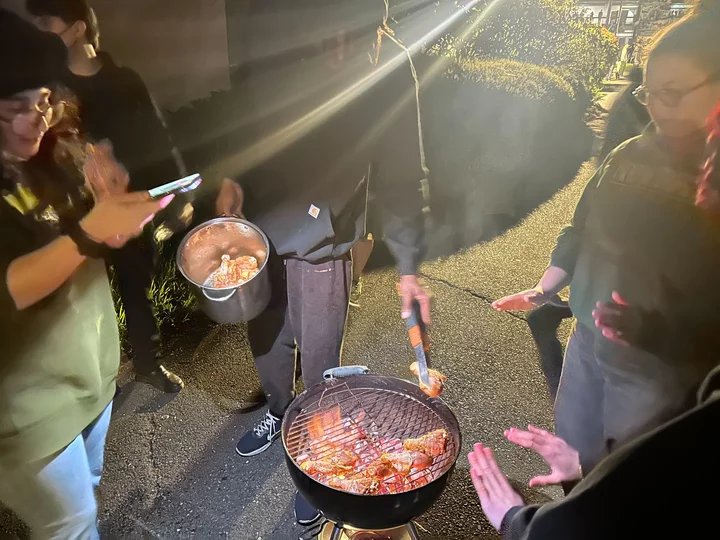
UPDATE, 10:37 p.m.: It has been quiet in the last hour. People seem to be settling in for the night.
###
UPDATE, 9:30 p.m.: Things are starting to get a little tense, as can be seen in the video above. Protesters inside the building are communicating via signs with the people outside. The police are between them.
The CHP helicopter that had been circling the scene has left, due to weather and — apparently — a close call with a drone.
###
UPDATE, 9:20 p.m.: Press release from Cal Poly Humboldt:
Several protesters are occupying Siemens Hall, an academic and administrative building on campus. Campus is closed through Wednesday, April 24 for the safety of the campus community.
The University is deeply worried about the safety of the students who remain in the building.
The University is urgently asking that the students listen to directives from the law enforcement that has responded and peacefully leave the building.
Students and others are advised to avoid the area of the building, as it is a dangerous situation.
Several protestors inside have barricaded themselves inside the building with furniture, vandalized parts of the building, and blocked entrances and elevators with tents, violating fire codes and creating extreme safety hazards for those inside.
The situation began at approximately 4:50 p.m. when University Police received reports of dozens of protesters occupying the building.
Classes in Siemens Hall were canceled, and the five courses that were in progress were evacuated. The building was shut down after protesters refused to leave voluntarily.
###
UPDATE, 9:10 p.m .: The crowd has only gotten larger after nightfall. The Outpost estimates that about 300 people are standing outside Siemens Hall.
Arcata City Councilmember Sarah Schaefer came up to the witness what was going on. “From what I can see outside, I think this is overkill,” she says of the police response.
###
UPDATE, 9 p.m.: Cal Poly Humboldt has announced that the campus will be closed until at least Wednesday. Police dispatch chatter notes that they’ll be shutting off WiFi to the building.
###
UPDATE, 8:25 p.m.: Things seem at more or less a stalemate at the moment, as night falls, per this video from the Outpost’s Andrew Goff, but a police dispatch channel notes that a CHP riot team is en route from Redding.
###
Photo: Andrew Goff.
Law enforcement officers from throughout the region have descended on Cal Poly Humboldt this evening, as pro-Palestine protesters conduct a major demonstration at the university. The protesters have occupied Siemens Hall, and are reportedly confronting police.
It is perhaps the most tense confrontation between Humboldt County law enforcement and local activists in decades. At about 7:45 p.m., one officer told dispatchers that there were about 100 protesters near the hall, with multiple fights taking place. The officer reported that other police had attempted to take students into custody, but the crowd had pulled them back.
At one point another officer called for a pepper ball launcher to be delivered.
At the same time, officers from Calfire, the California Highway Patrol and the Ferndale police could be seen speeding through Eureka toward the scene. Ambulance and fire personnel are staged away from the action at locations around the university.
Lost Coast Outpost “Scanner Traffic Indicates” correspondent “Todd,” noted at around 6:30 p.m. that a protest on the campus was getting out of hand at the same time as two major rescue operations were underway in the east part of the county. At around 7:30 p.m. — about an hour before sunset — a CHP helicopter that had been working those rescues was diverted to the incident, according to scanner traffic.
According to the @humboldtforpalestine Instagram account, which posted a statement at around 7 p.m., protesters are demanding that the university “disclose all holdings and collaborations with the zionist entity,” an academic boycott of Israeli universities, proactive pardons for the protesters and, finally, an immediate ceasefire and end to the occupation of Palestine.
The university has canceled all classes in Siemens Hall for the time being.
The Outpost’s Andrew Goff is at the scene. We will be updating this post.
Supreme Court Hears Arguments in Major Homelessness Case
Marisa Kendall / Monday, April 22 @ 2:10 p.m. / Sacramento
Tents outside the First Street U.S. Courthouse in Los Angeles, where homeless advocates and supporters rallied as the U.S. Supreme Court in Washington D.C. heard oral arguments in the Grants Pass case on April 22, 2024. Photo by Ted Soqui for CalMatters
In a case that could drastically alter how cities in California and beyond deal with homeless encampments, U.S. Supreme Court justices today weighed whether to allow broader punishment for people camping in public spaces.
“Laws like ours, they really do serve an essential purpose,” said Theane Evangelis, arguing on behalf of the city of Grants Pass, Oregon, which banned encampments. “They protect the health and safety of everyone. It is not safe to live in encampments. It’s unsanitary, we see what’s happening. And there are the harms of the encampments on those in them and outside.”
If the justices side with Grants Pass, they could roll back limits that for years have curtailed cities’ ability to clear encampments and punish campers. Two prior Ninth Circuit appellate rulings determined that penalizing an unhoused person for camping in public, if they have nowhere else to sleep, violates the Constitution’s 8th Amendment ban on cruel and unusual punishment.
The Supreme Court’s opinion is expected in late June. However the justices come down, it will affect cities throughout the country. But nowhere will it be felt as acutely as in California, where nearly half of the country’s entire unsheltered homeless population lives.
What’s at stake in the Grants Pass case?
The case, Johnson vs. Grants Pass, stems from a 2018 lawsuit challenging ordinances that ban camping even when there are no beds available in a homeless shelter. Because humans need to sleep somewhere, homeless residents of Grants Pass sued, claiming the ordinance criminalizes them for being homeless and violates the 8th Amendment.
“The ordinances by design make it physically impossible for homeless people to live in Grants Pass without facing endless fines and jail time,” said attorney Kelsi Brown Corkran, who argued on behalf of the homeless respondents today.
The lower courts sided with the homeless residents. Now, Grants Pass is asking the Supreme Court to overturn that ruling.
More than three dozen elected officials and organizations — including California Gov. Gavin Newsom — filed briefs weighing in on the case. Cities, law enforcement agencies and Newsom say the prior rulings tie their hands as they try to manage dangerous and unsanitary encampments. Several cities, including San Francisco, Sacramento, Chico and San Rafael, have been hit with court orders stopping or delaying them from clearing encampments.
But advocates for the civil rights of unhoused people worry if the former rulings are overturned, cities will be able to arrest people just for being homeless.
What did the justices say?
At times, the Supreme Court seemed divided along ideological lines, with the liberal justices appearing more sympathetic to the homeless residents’ arguments than their conservative counterparts. The Supreme Court has a 6-3 conservative majority.
Justices Sonia Sotomayor and Elena Kagan, both appointees of former President Barack Obama, grilled the Grants Pass attorney over her claim that the city’s ordinance does not make it a crime to be homeless.
“Where do we put them if every city, every village, every town lacks compassion and passes a law identical to this?” Sotomayor asked. “Where are they supposed to sleep? Are they supposed to kill themselves not sleeping?”
But even Justice Brett Kavanaugh, an appointee of former President Donald Trump, poked holes in the Grants Pass argument that the city’s camping ban helps get people off the street and into shelter.
“How does it help if there are not enough beds for the number of homeless people in the jurisdiction?” he asked the Grants Pass lawyer.
“This is a difficult policy question,” Evangelis answered, adding that the ordinance encourages people to accept shelter beds when they open up.
After multiple citations under the Grants Pass ordinance, a homeless resident could go to jail. What then? Kavanaugh asked. “You end up in jail for 30 days, and then you get out, I mean, you’re not going to be any better off than you were before in finding a bed,” he said.
Evangelis insisted an arrest often is what pushes people to finally accept help, whether it’s treatment or other services.
The justices homed in on a key question of the case: Because Grants Pass prohibits camping throughout the entire city, does the ordinance criminalize the status of being homeless? Or does the ordinance criminalize the behavior of camping in public?
That’s important because, decades earlier, the Supreme Court found a person cannot be punished for their status, but only for their actions — someone cannot be arrested for being addicted to drugs, for example, but they can be arrested for using drugs.
In addressing the status-versus-action question, the justices ventured down some philosophical rabbit holes. The conservative justices scrutinized the rationale used in the prior rulings.
“Is being a bank robber a status?” Chief Justice John Roberts Jr., an appointee of former President George Bush, asked. And: If someone is hungry and needs food to survive, can they be punished for breaking into a store?
 A woman listens to audio from the U.S. Supreme Court oral arguments in a lawsuit against the Oregon city of Grants Pass, in Los Angeles on April 22, 2024. Photo by Ted Soqui for CalMatters
A woman listens to audio from the U.S. Supreme Court oral arguments in a lawsuit against the Oregon city of Grants Pass, in Los Angeles on April 22, 2024. Photo by Ted Soqui for CalMattersIf someone has no access to a bathroom, can they be punished for urinating or defecating in the street? Justice Amy Coney Barrett, a Trump appointee, asked. Where do we draw the line? She wanted to know.
Supporters of the homeless plaintiffs in Grants Pass say this isn’t a liberal-versus-conservative issue.
“We can’t predict what the court is going to do, but every single time the court has heard this question, they’ve agreed that punishing people for sleeping outside when they have nowhere else to go is cruel and unusual,” Jesse Rabinowitz, communications director for the National Homelessness Law Center, said during a media call that included a lawyer representing the homeless respondents. “So we remain hopeful that the Supreme Court will do the right thing and agree with all the lower courts’ decisions and affirm that everybody, regardless of housing status, is protected by the constitution.”
Lawyers for Grants Pass did not respond to emails seeking comment.
People rally at the courthouse
As the justices considered the case today, hundreds of people rallied in front of the Supreme Court in Washington D.C. to speak out against criminalizing homelessness. People also gathered in Los Angeles and San Francisco.
Ann Olivia, CEO of the National Alliance to End Homelessness, attended the D.C. rally and said it was heartening to see so many people supporting the rights of unhoused people.
But, she said, “whatever happens in this case isn’t going to create more affordable housing and services for people.”
###
CalMatters.org is a nonprofit, nonpartisan media venture explaining California policies and politics.

